By Eleanor Kennelly Gaetan
WASHINGTON (CNS) – In his internet safety presentations at schools, Justin Gaertner emphasizes that safety “comes back to parents and kids being vigilant.”
“If you see something, say something,” he tells his audiences.
Wounded in war while serving in Afghanistan as a Marine veteran, Gaertner works with the Department of Homeland Security, pursuing predators who collect and trade child pornography – more accurately termed, child sexual abuse imagery – on the internet.
“We all have to be very careful,” Gaertner told Catholic News Service.
One resource for guidance on internet safety is the National Center for Missing and Exploited Children, or NCMEC, runs the website netsmartz.org with tip sheets and guidance tailored for various audiences. The site is one of more than a dozen sites with child safety resources the U.S. Conference of Catholic Bishops’ Secretariat for Child and Youth Protection lists at https://bit.ly/1DlKIJR.
For parents, NCMEC suggests the best way to protect your children is to actually engage with them in accessing things online: offer to play the games they like, ask them to show you what platforms they use, discuss being respectful online and never responding to sexual questions or requests for pictures.
“Your kids might not tell you everything but ask anyway,” the center says. “Regular conversations about safety can go a long way in increasing trust and communication.”
The site www.faithandsafety.org tells parents: “No technology, no piece of software, no parental control is ever a substitute for active and involved parenting. The most effecting internet safety tool is you!”
Launched in 2013 by the USCCB’s Department of Communications and the Greek Orthodox Archdiocese of America, the Faith and Safety website has a variety of resources, including reviews of mobile apps; ways to address issues faced by children online, such as bullying; and resources to educate parents on protecting their home networks.
It also features regular columns by leading Catholic and Orthodox figures on connecting faith and technology, as well as news updates, how-to guides and video content.
“All safety – especially mobile and online safety – begins at home,” the site’s homepage says. “The habits you exhibit about technology use in your home will be the same habits your children learn. … Model the behavior you yourself expect from your children.”
Category Archives: U.S. News
Societal shifts seen in acknowledging sex abuse, finding ways to address it
By Julie Asher
WASHINGTON – In her 25 years of working with sexual trauma issues, Eileen Dombo said, “our culture has shifted” in terms of believing people more readily when they come forward about being abused and being more “aware of the signs of sex abuse, signs the child is being groomed.”
“We have a greater capacity to be open to the belief that an adult can harm a child in this way, when for too many years culturally we haven’t been able to believe,” said Dombo, an associate professor in the National Catholic School of Social Service at The Catholic University of America in Washington.

Still, “child sex abuse is a massively big problem in our culture,” she told Catholic News Service. “It crosses all kinds of stratifications – socioeconomic, race, religion, ethnicity.”
About one in 10 children will be sexually abused before their 18th birthday, according to Darkness to Light. Dombo called such numbers “staggering.”
And despite the fact sex abuse victims are believed more now than in the past, a lot of this abuse still goes unreported, she said.
“Sometimes the child does tell an adult and they are not believed, and the response to the initial disclosure can silence someone for decades,” Dombo explained, “even if they try to tell in a child’s way – not concretely, but say, ‘This person makes me uncomfortable, or ‘I don’t want to be around them or don’t want to go to that place’ – if they are not asked to provide more clarity, they feel shut down.”
Or in other cases, “they disclose and they are not believed because the person (the abuser) is so beloved or powerful or an authority figure,” she added.
“One of the greatest things that can be done” to address abuse “is empowering a child with the language, the knowledge and the tools to spot someone – or tell a trusted adult – when someone is making them uncomfortable,” said Dombo, who specializes in working with trauma survivors.
She also applauded the many safe environment programs and the training that exist now to help children understand “good touches and bad touches” and how to talk to adults about what makes them uncomfortable as well as teaching adults how to respond when a child comes forward with such a concern.
Melissa Grady, like Dombo, is at Catholic University’s National Catholic School of Social Service, where she is an associate professor and chair of the school’s clinical concentration. Her area of research is in working with those who have committed sexual offenses.
Grady stated that many in this field “have really pushed for sexual abuse to be considered a public health problem.” Using this approach, she said, “prevention efforts should be oriented around using levels of prevention as outlined by the Centers for Disease Control: primary, secondary and tertiary.”
She said primary prevention would take a universal approach by providing interventions to everyone, including providing age-appropriate sex education, reinforcing it with more information as they age, which includes making sure they understand consent. Grady added that such programs should take place beginning in preschool and be continued through the university level.
Grady stated that secondary prevention efforts seek to intervene with those who are identified as “at risk.” For sexual abuse prevention, it would mean ensuring that those who have been abused get services, and also provide interventions to those who show sexualized behaviors at a young age or other concerning behaviors. Today “there is much more awareness that these kids need immediate help and intervention,” she said.
Tertiary prevention involves providing interventions to those who have already abused in order to prevent them from doing it again in the future. This would mean, she said, that “we need to provide competent and effective practices to those who have offended to reduce their risk of ever committing another crime.”
Grady stated that there are numerous theories regarding what leads someone to sexually abuse another, but there is not a clear answer.
“We do know that this population has experienced significant trauma, not just in number, but also a wide variety of traumatic experiences,” she said. “These include surviving sexual abuse, physical abuse, physical and/or emotional neglect, and various types of family dysfunction. What we are unclear about is how such abuse histories contribute to subsequent offending.”
She went on to say that we need more research on what factors lead someone to commit such crimes and how to provide effective treatment that addresses both their own victimization as well as their offending behaviors to ensure that they never commit such a crime again.
Grady also shared, however, that among the numerous facts that are misunderstood about this population, is that while there are certainly some individuals who repeatedly re-offend, “ they actually have one of the lowest recidivism rates of any criminal population.”
“However, we need more resources to learn about how to make those rates even lower and to implement effective interventions strategies focused on prevention so that no one should have to experience these crimes,” she said.
Dombo similarly told CNS that “the vast majority of people who are sexually abused” do not become abusers.
“However, you have to ask the question what would lead someone to do this to a child?” she said. Like Grady, she said many have had some form of trauma in their lives and that there is no one reason why someone would abuse a child. Some suffer from sociopathy; some may simply have a disregard for social mores; for some it is “a crime of opportunity.” For still others, Dombo said, it could be a crime related “to personal issues of power” – they feel powerless in their own lives so abusing someone is a way to have power over someone.
The damage sexual abuse does to children can be wide-ranging, so the sooner an abuse victim gets supportive help in family therapy or from other trained professionals the better, Dombo said.
Abuse can impact children’s “self-esteem, their beliefs, their view of themselves in the world, their ability to trust others (and) develop trusting relationships the rest of childhood and in adulthood,” she explained. It can affect coping behaviors, create educational problems and behavioral problems, she continued; victims can have difficulty with their peers, become aggressive, can be targeted as ‘a problem child.’”
In adolescence, abuse victims might turn to drugs or alcohol, cause self-injury, act out sexually, have suicidal thoughts or attempt suicide, suffer anxiety, depression and/or post-traumatic stress disorder, Dombo said, and many common mental health issues “stem from untreated abuse.”
“The one thing we have been trying to do as social workers, educators and researchers is make sure all the services people come in touch with – drug counseling, mental health, etc. – are trauma-informed, meaning if they have the sense the person is a trauma survivor, we create a space that allows the potential for disclosure,” Dombo told CNS.
In addition, Grady feels that prevention efforts should absolutely include teaching people how to keep from becoming victims, but they also should include helping children learn to express themselves without “resorting to any kind of violence. Children need to learn how to regulate their behaviors and emotions, and to “cognitively process” challenging situations, as well as how to be empathetic and kind.”
“We need to address prevention by helping children to learn simultaneously – how do you keep yourself safe from others while learning to manage yourself?” she added.
Dombo sees strides being made in addressing child sex abuse “in terms of the culture’s willingness to see that we have a problem and not deny this is a massive problem.”
Asked about the Catholic Church’s response to abuse, “we have a systemic response,” she said, referring to the U.S. bishops’ “Charter for the Protection of Children and Young People” and the protocols it spells out.
The church is taking responsibility “for keeping all God’s children safe from harm” and “starting to dismantle” structures that have led to abuse, Dombo said.
“No other institution has undertaken a public study of sexual abuse and, as a result, there are no comparable data to those collected and reported by the Catholic Church,” said the John Jay report issued in May 2011 on “The Causes and Context of Sexual Abuse of Minors by Catholic Priests in the United States, 1950-2010.”
“Other organizations should follow suit and examine the extent of sexual abuse within their groups to better understand the extent of the problem and the situations in which sexual abuse takes place,” it said.
The study was mandated by the U.S. bishops’ charter and was commissioned by their independent lay-run National Review Board. Conducted by the John Jay College of Criminal Justice in New York, it provides a framework for understanding not only the sexual abuse of minors by Catholic priests but the sexual victimization of children in any institution.
“Only with such an understanding can effective prevention policies be articulated and implemented,” the report said. “While some sexual abuse will always occur, knowledge and understanding of this kind of exploitation of minors can limit the opportunities for abuse while also helping to identify abuse situations as early as possible.”
(Editor’s Note: The full John Jay study can be found at https://bit.ly/1Tp2UdH.
Follow Asher on Twitter: @jlasher)
Scam Alert: emails, texts target generous faithful

By Maureen Smith
JACKSON – Scammers have taken aim at pastors, parishes and even the bishop in the last couple of months. Just after Christmas, Jackson St. Richard parishioners received a warning that someone pretending to be pastor Father John Bohn was using a fake email address to try and convince people to buy gift cards for him. Father Lincoln Dall, pastor of Pearl St. Jude Parish and Father Albeen Vatti, pastor of Madison St. Francis of Assisi, had to warn their parishes of similar schemes. Most recently, the parishes served by the Priests of the Sacred Heart in North Mississippi sent out warnings to their members. Even Bishop Joseph Kopacz was not immune. Twice in the last four months, someone has created an email account using his name and sent messages asking for gift cards.
The Federal Trade Commission (FTC) and the Mississippi Attorney General’s Office have both sent out alerts about scams just like these. Priests and pastors will never email parishioners looking for gift cards and would never send a business email from a private account such as aol or gmail.
“Scammers are good at convincing people there really is an emergency, so lots of people have made the trip to the Walmart or Target or CVS to buy gift cards to send these callers. And scammers love gift cards – it’s one of their favorite ways to get your money. These cards are like giving cash – and nearly untraceable, unless you act almost immediately,” wrote Jennifer Leach, Assistant Director, Division of Consumer and Business Education, FTC, in a blog post for the federal agency. She added that gift cards could never be used as payment for any kind of emergency such as a car repair or plane ticket.
If someone has fallen victim to this type of scam, there is some help, but the victim has to act quickly. “If you’ve bought a gift card and lost money to someone who might be a scammer, tell the company who issued the card. (The contact info might be on the card, but might require some research) Call or email iTunes or Amazon or whoever it was. Tell them their card was used in a scam. If you act quickly enough, they might be able to get your money back. But – either way – it’s important that they know what happened to you. And then please tell the FTC about your loss. Your report helps us try to shut the scammers down,” wrote Leach. The FTC has an online complaint page where victims can enter their information.
A follow up scam at St. Richard and St. Jude involved text messages sent to parishioners asking for gift cards for the pastor. St. Richard parish secretary Chelsea Vaughn said she was able to report the phone numbers used for the texts to Google Voice so they could be shut down. Most parishes impacted sent emails to their parishioners and posted warnings about the scams to social media, but it is hard to tell how many people may have responded before the warnings went out.
On Friday, April 12, the diocese put out a warning about a job application scam. Someone is placing job ads on Indeed.com pretending to represent the Diocese of Jackson. The supposed contact attempts to get personal information from applicants. The chancery office does not have any ads currently running on this job site and the Diocese of Jackson would never ask for personal information on the phone before a staff member conducts an in-depth interview. The diocese does not currently have a David Morgan or Jennifer Smith in the HR department.
A second type of scam landed in the diocesan payroll office. When the diocese reported it, State Attorney General Jim Hood’s office said it had already issued an alert about this kind of scheme because it had surfaced at state agencies. Hood explained the scam in his alert:
“The scammers are emailing agencies’ Human Resources (HR) Directors requesting a Direct Deposit Form, which is the step taken when an employee wishes to sign up for or make a change to their paycheck deposit. The email appears to come from an employee’s work email address. In one case, an email address of a state agency’s executive director was spoofed. The email indicated that the executive director was changing bank accounts and needed to change the account information on file at the office. When the HR director sent the proper forms to make such a change back to the email address that made the request, the address appeared as a gmail account. The scammer behind that account quickly replied with the “new” banking information, a fake voided check, and the signed forms.”
When someone emailed the diocesan payroll office impersonating an employee the payroll office was able to ask the employee in person to verify the change. Luckily, this scam was stopped before any money was deposited.
The bottom line, say experts, is that people should always verify in person or by phone any request involving money or personal information. Email and text messages are convenient, but anonymous and easily created by crooks.
After unrest and anger, new Washington archbishop wants to rebuild trust
By Rhina Guidos
HYATTSVILLE, Md. (CNS) – Archbishop Wilton D. Gregory, set to become the new head of the Archdiocese of Washington, promised to serve with truth, love and tenderness in a region where he acknowledged “unrest and anger,” after the downfall of former Washington Cardinal Theodore E. McCarrick and the church’s current sex abuse scandal.
“I want to offer you hope. I will rebuild your trust,” Archbishop Gregory said during an April 4 news conference. “I cannot undo the past, but I sincerely believe that together we will not merely address the moments we’ve fallen short or failed outright, but we will model for all the life and teaching of our Lord Jesus Christ and we will reclaim the future for our families, for those who will follow us. That is my greatest, indeed, it is my only aspiration.”
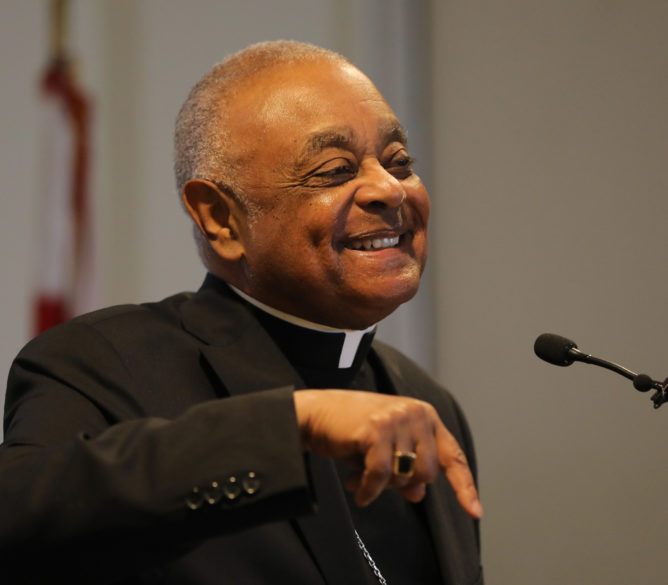
Archbishop Gregory was introduced to media gathered for the announcement at the Archdiocese of Washington’s pastoral center in Hyattsville by Cardinal Donald W. Wuerl. Pope Francis accepted Cardinal Wuerl’s resignation as Washington’s archbishop in October and named him apostolic administrator. The cardinal, now 78, had submitted his resignation, as is mandatory, to the pope when he turned 75, but it had not been accepted until last fall.
Cardinal Wuerl had faced pressure to resign following an Aug. 14, 2018, grand jury report detailing past sexual abuse claims in six Pennsylvania dioceses, which showed a mixed record of how he handled some of the cases when he was bishop in Pittsburgh from 1988 until 2006.
Cardinal Wuerl also recently faced questions about what and when he knew about past accusations involving McCarrick, who was stripped by Vatican officials of his clerical status Feb. 16 after months of accusations that he may have sexually molested minors and abused seminarians at various times and places in his 60 years as a priest.
Cardinal Wuerl remains apostolic administrator until the scheduled May 21 installation of Archbishop Gregory, who offered kind words for his predecessor while acknowledging shortcomings.
“It’s difficult to come into a situation where there is unrest and anger,” Archbishop Gregory said. “I’ve known Donald Wuerl for over 40 years. He is a gentleman. He works very hard for the church. He’s acknowledged that he’s made mistakes. That’s a sign of the integrity of a man. If I can shed light on what I think we need to do in response to some of the mistakes that he’s acknowledged and asked forgiveness for, I’ll do that.”
As he begins his tenure in Washington, following a 14-year stint in Atlanta, Archbishop Gregory said he wants to spend time “in the field.”
“For the foreseeable time, I’m not going to spend too much time in the office,” he said. “I have to be in the parishes, I have to meet with my priests. Why? Because I can’t be their archbishop if I don’t give them an opportunity to tell me what’s in their hearts, to come to know me and to establish a bond.”
He said he wanted to communicate to them his support, affection and yearning to work for Catholics of the region. He acknowledged that Washington, as the country’s seat of political power, may ask for political savvy from its archbishop.
“I see this appointment to be the pastor of the Archdiocese of Washington, I was not elected to Congress and so I intend to speak and promote the church’s moral and doctrinal teaching that comes with the job, but I think my involvement with the political engines that run here has to be reflected through that prism,” he said. “I’m here as pastor. The pastor must speak about those things that are rooted in the Gospel but I’m not going to be at the negotiating tables. That’s not my place. My place is in the pews with my people.”
Bishop looks forward to serving, being ‘part of God’s church’ in Memphis
By Catholic News Service
MEMPHIS, Tenn. – Bishop David P. Talley, named by Pope Francis March 5 to be the next bishop of Memphis, said that being at a news conference on the day of his appointment marked his fifth visit to Memphis.
“The next time, I come to live with you and love with you and serve with you and to be a part of God’s church with you,” he said.
Bishop Talley, 68, has headed the Diocese of Alexandria, Louisiana, since 2017. He was named coadjutor in 2016 and automatically succeeded Bishop Ronald P. Herzog when he retired. A former auxiliary bishop of Atlanta, Bishop Talley will be installed as the sixth bishop of Memphis April 2.
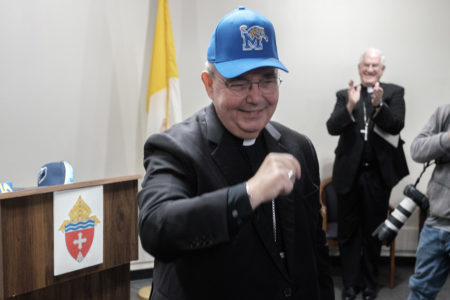
Bishop David Talley wears a University of Memphis hat March 5, 2019, as he is introduced as the bishop of Memphis at the Catholic Pastoral Center in Memphis. He will be installed April 2. (CNS photo/Rick Musacchio, Tennessee Register)
Bishop Talley’s new appointment came just over four months after Pope Francis forced Bishop Martin D. Holley to step down as bishop of Memphis.
Joining Bishop Talley at the news conference were Archbishop Joseph E. Kurtz of Louisville, Kentucky, who was named apostolic administrator of the diocese after Bishop Holley’s resignation in October 2018, and Nashville Bishop J. Mark Spalding.
Archbishop Kurtz said Bishop Talley brings to Memphis a “wealth of experience” as pastor and bishop, and “most importantly, he brings the heart of a pastor and a sterling reputation as a good shepherd.”
“It’s a wonderful appointment for the Diocese of Memphis, and I can’t wait to work with him on the issues concerning the state of Tennessee,” Bishop Spalding said.
Born Sept. 11, 1950, in Columbus, Georgia, Bishop Talley was raised a Southern Baptist and decided to become a Catholic while a student at Auburn University in Alabama. He was received into the church when he was 24. He was ordained a priest of the Atlanta Archdiocese in 1989.
Bishop Talley received a bachelor’s degree in philosophy from Auburn University and a master’s degree in social work from the University of Georgia. He worked as a social worker for several years before becoming a seminarian for the Archdiocese of Atlanta, studying at St. Meinrad School of Theology in St. Meinrad, Indiana. He also has a doctorate in canon law from the Pontifical Gregorian University in Rome.
He was presiding over confirmations Feb. 9 when he received a call from Archbishop Christophe Pierre, apostolic nuncio, Bishop Talley said at the news conference.
When Archbishop Pierre informed him of his new appointment, “I was in shock. I said yes immediately to the Holy Father and his nuncio. But I was reeling,” Bishop Talley said. “I had been in Alexandria for two-and-a-half years and we were just getting our wings.
“He heard my shock,” the bishop said, and Archbishop Pierre suggested he call Archbishop Kurtz, who is the metropolitan for the province of Louisville, which includes the three dioceses of Tennessee and the four of Kentucky.
“From that day, he’s done everything he can to support me and prepare me for this day. So publicly today I want to thank Archbishop Kurtz,” Bishop Talley said.
Bishop Talley also thanked Pope Francis and Archbishop Pierre. “He loves our bishops,” he said of the apostolic nuncio.
The new Memphis bishop said he had not yet visited the Memphis grave of Sister Thea Bowman, who is being considered for sainthood, “But I will.”
He also pledged to visit the National Civil Rights Museum in the Lorraine Hotel, where the Rev. Martin Luther King Jr. was assassinated in 1968. “From the time I was a tiny little Baptist boy, Dr. King was a hero of mine,” Bishop Talley said. “He was then, he is now. He is a mentor for me about how you take the Gospel into the streets to bring about justice.” Bishop Talley takes over a diocese demoralized after the two-year tenure of Bishop Holley, who was forced to resign by Pope Francis for mismanagement.
According to a report in the Commercial Appeal, Memphis’ daily newspaper, Bishop Talley promised to begin healing the diocese by listening.
The paper quoted him as saying, “Usually, when people have gone under crisis or stress and it’s held in and not expressed, there is tension and stress in that. I don’t come here to fix anything. We have a Savior and he brings us together. My work is to be one instrument of his.”
The Diocese of Memphis comprises 10,682 square miles. Out of a total population of over 1.5 million, about 60,320, or 4 percent, are Catholic.
It was established in 1971, carved out of the Diocese of Nashville, which before then included the entire state of Tennessee.
The Diocese of Memphis includes the western third of the state, roughly between the Tennessee and Mississippi rivers.
(Contributing to this story were staff members of the Tennessee Register, newspaper of the Diocese of Nashville.)
Abuse protocols in place since ’02
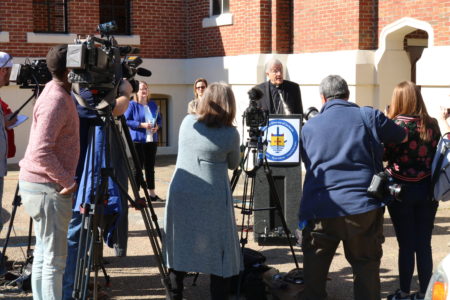
JACKSON – Bishop Joseph Kopacz speaks to the media on Tuesday, March 19, about the release of the names of clergy and ministers accused of abuse. (Photos by Tereza Ma)
By Catholic News Service
WASHINGTON – Surveys show that many Catholics are unaware of the steps that the bishops have taken since 2002 to prevent child abuse and to monitor its own performance.
In 2002, the U.S. bishops first approved their “Charter for the Protection of Children and Young People” to spell out protocols for how U.S. Catholic dioceses and eparchies must address sex abuse.
The charter, which is revised regularly, spells out strict procedures for removing from ministry those credibly accused of abusing minors. It also called for training children and all adults who work with them in church and school settings to recognize and appropriately handle possible sexual abuse, and created diocesan and national mechanisms for monitoring compliance.
The charter established the position of victim assistance coordinator in every diocese and eparchy “to coordinate assistance for the immediate pastoral care of persons who report having been sexually abused as minors by clergy or other church personnel.” The coordinator in the Diocese of Jackson is Valerie McClellan.
The charter directs action in:
– Creating a safe environment for children and young people.
– Healing and reconciliation of victims and survivors.
– Making prompt and effective response to allegations.
– Cooperating with civil authorities.
– Disciplining offenders.
The charter mandated the creation of the Office (now Secretariat) of Child and Youth Protection, which assists office assists “in the consistent application of principles” adopted by the charter and provides “a vehicle of accountability and assistance” to dioceses and eparchies. Vickie Carollo heads this office in the Diocese of Jackson.
In 2002, the bishops also established the lay-run National Review Board, to monitor implementation of the charter. Francesco Cesareo has been the board’s chairman since 2013. He is president of Assumption College in Worcester, Massachusetts.
The full text of the U.S. bishops charter can be found in English and Spanish, respectively, at https://bit.ly/2QNZgh5 and https://bit.ly/2WWBnH4.
Under the charter, each diocese and eparchy undergo an annual audit to ensure compliance with it. Each audit report includes recommendations for corrective action where shortcomings are discovered.
Last June, the 15th annual report on implementation of the charter showed a decrease in allegations of clergy sex abuse from the two previous years but also indicated the need for continued vigilance since charges were raised by more than 650 adults and 24 minors.
The audit also showed that dioceses/eparchies provided outreach and support to 1,905 victims/survivors; training on abuse prevention and safe environment was provided to more than 4.1 million children and more than 56,000 priests, deacons and candidates for ordination; and background checks have been administered to 97 to 99 percent of all adults serving in ministry with children.
“That’s no small feat,” Cesareo told attendees at the Child and Youth Protection Catholic Leadership Conference in New Orleans last June. “Yet, we are not finished. We can never be finished.”
During the U.S. bishops’ general fall assembly in Baltimore in November, Cesareo called for broadening the scope of the “Charter for the Protection of Children and Young People” to include bishops. He also urged publishing complete lists of credibly accused clergy in all dioceses; improving the audit process; and enhancing accountability for bishops regarding cases of abuse.
Summer Institute classes announced
MOBILE, Alabama – Spring Hill College announces the lineup of classes for its Summer Institute of Christian Spirituality. The one or two-week sessions offer a chance to delve into a particular topic. They take place on campus in Mobile June 3-7 and 10-14 or in Atlanta June 14-16 and 21-23.
Established in 1993, the annual institute offers a unique blend of academic challenge and spiritual enrichment, specifically designed for adults seeking to deepen their faith, exploring the vast traditions of Christian spirituality and, if the student would like, for pursuing one of the school’s certificate or degree programs.
The curriculum is made up of a series of one-credit courses offered in one-week or intensive weekend sessions, studying a variety of spiritual masters and mystics, along with biblical, liturgical and social themes.
Taught in the Jesuit tradition of excellence, courses may be taken for graduate or undergraduate credit or on an easy listening basis (no required assignments, no grade, no transcript record kept). While rooted in Catholic theology, the program is fully ecumenical and welcomes persons of all faiths.
Course topics this year include: Unity and Jesus Forsaken: Theology of Chiara Lubich and the “Work of Mary” (Focolare Movement); Joseph and His Brothers: Resentment and Reconciliation; Spiritual Discernment in Time of Crisis: Thomas Merton in the 1960s; and Spirituality of Inter-Religious Dialogue.
Visit www.shc.edu/sics for course and registration information.
Bless me Father for I have sinned
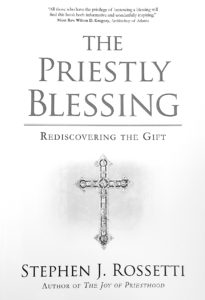 By James Tomek
By James Tomek
The following is a review of Stephen Rossetti’s The Priestly Blessing: Rediscovering the Gift (Notre Dame U: Ave Maria P, 2018). Sacraments are signs or events that are imbued with the presence of God. Rossetti substitutes sanctifying grace for God — the grace that allows us to transform material earthly presences into a more divine presence. Whenever we use any material resource like water and food for the benefit of humankind, we transform these resources into the body of Christ. Sacramentals are sacred signs that resemble the sacraments like blessings, crucifixes, rosary beads, and holy water. They are instituted by the Church rather than directly by Christ. They do not confer the grace of the Holy Spirit the way sacraments do. Stephen Rossetti’s book is a discussion of how blessings join into the nature of sacrament.
Father Rossetti’s elements of Blessings conform to Richard McBrien’s three essential elements of Catholicism: sacramentality, mediation and communion. Sacramentality sees all creation as sacred. Mediation adds that sacraments cause what they signify – like Mary, transforming worldly things into heavenly things. Communion sees us as Church being the sacrament of Jesus and, acting as a community, working together to achieve a heavenly communion of all saints, living, dead, and to come. (McBrien, Catholicism 9-13).
Father Rossetti defines priestly blessings as acts of singling out or consecrating persons, places, events, or things to a sacred or liturgical use. When we bless, we approve or God approves! Rossetti is talking mostly to priests, citing the greatest blessing when the priest imparts God’s consecration of the gifts of bread and wine at the Eucharist.
Stephen Rossetti begins with the use of blessings in the Old and New Testaments. In the Old Testament, blessing is a reciprocal action. We first bless or praise God. The berekah is the source of all blessings. Jesus continues this idea with the beatitudes, telling us what we should bless. Jesus lays hands on the food and on the apostles, giving them the power, in turn, to continue to set things aside for sacred use. Father Rossetti counsels us to be generous with blessings so we can evangelize or encourage others to pray.
A major theme of the former collection or book of blessings was exorcism, driving out evil (apotropaic) from things blessed. The newer book of blessings, revised at Vatican II, emphasizes that we bless the people using the objects blessed, de-emphasizing magical elements and encouraging more positive actions rather than just eliminating evil. Rossetti does not include the blessing of graves, but here is an important synthesis of where we not only bless the people, but also the ground where we all will be buried. The Church encourages us to be a community when receiving blessings stressing the liturgical prayer aspect.
Who can bless? Clergy vs Laity? As a lay ecclesial minister at Sacred Heart in Rosedale, how can I properly preside over the final blessing at our services in the absence of a priest? The priests “impart” blessings. The laity “invoke” them. While priests are more direct sacraments of Jesus in Holy Orders, imparting blessings directly, I feel no inferiority in that I have to ask God to bless us. Blessings are sacramentals. Are they “lower” than sacraments in imparting grace? Father Rossetti sees sacramentals as radiations of the sacraments with blessings standing in the fore front. I surely hope I can evolve to be a sacramental, clutching on to a grace from Jesus. Father Rossetti prays for “piety,” A BIG WORD. Joan of Arc says that we bless because Jesus did, and He commanded us to do his work. Piety’s root word goes back to compassion or sensitivity to those who are hurting (pity’s root meaning). When we feel piety for others we are close to blessing our neighbors. Saint Joan – Pray for us that we may feel this piety. Bless us Father for we have sinned.
Palms to ashes: A few things to know about Ash Wednesday
By Mark Pattison
WASHINGTON (CNS) – Ash Wednesday is March 6 this year. Here are some things to know about Ash Wednesday and the kickoff to Lent:
In the Table of Liturgical Days, which ranks the different liturgical celebrations and seasons, Ash Wednesday ties for second in ranking – along with Christmas, Epiphany, Ascension, Pentecost, Sundays of Advent, Lent and Easter, and a few others. But Ash Wednesday is not a holy day of obligation, though it is a day of prayer, abstinence, fasting and repentance.
Top ranked in the table are the Paschal Triduum – the Holy Thursday Mass of the Lord’s Supper, Good Friday and the Easter Vigil – along with Easter Sunday. Good Friday isn’t a holy day of obligation either, but Catholics are encouraged to attend church for a liturgy commemorating Christ’s crucifixion and death.
Ash Wednesday begins the liturgical season of Lent. There are hymns that speak to the length of the season – one of them is “Lord, Who Throughout These Forty Days” – but the span between March 6 and Easter Sunday, which is April 21, is 46 days. So what gives?
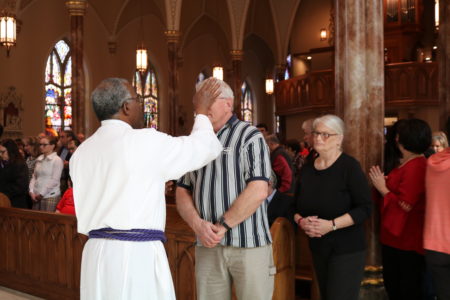
JACKSON – Wesley Lindsay places ashes on the forehead of Paul Byrne as Janna Avalon waits in line on Ash Wednesday 2018 in the Cathedral of St. Peter the Apostle. (Photo by Maureen Smith)
“It might be more accurate to say that there is the ’40-day fast within Lent,'” said Father Randy Stice, associate director of the U.S. Conference of Catholic Bishops’ Secretariat of Divine Worship.
“Historically, Lent has varied from a week to three weeks to the present configuration of 46 days,” Father Stice said in an email to Catholic News Service. “The 40-day fast, however, has been more stable. The Sundays of Lent are certainly part of the time of Lent, but they are not prescribed days of fast and abstinence.” There are six Sundays in Lent, including Passion Sunday.
The ashes used for Ash Wednesday are made from the burned and blessed palms of the previous year’s Palm Sunday.
“The palms are burned in a metal vessel and then broken down into a powder. I believe ashes can also be purchased from Catholic supply companies,” Father Stice said.
“As far as I know, palms from the previous year are always dry enough,” he added. “Parishes normally ask parishioners to bring their palms shortly before Ash Wednesday, so there is no need to store them. People usually like to keep the blessed palm as long as possible.”
Almost half of adult Catholics, 45 percent, typically receive ashes at Ash Wednesday services, according to the Center for Applied Research in the Apostolate at Georgetown University.
You might not have noticed, but the use of the word “Alleluia” is verboten during Lent. What is known as the “Alleluia verse” preceding the Gospel becomes known during Lent as “the verse before the Gospel,” with a variety of possible phrases to be used – none of which include an alleluia.
“The alleluia was known for its melodic richness and in the early church was considered to ornament the liturgy in a special way,” Father Stice said, adding it was banned from Lenten Masses in the fifth or sixth century.
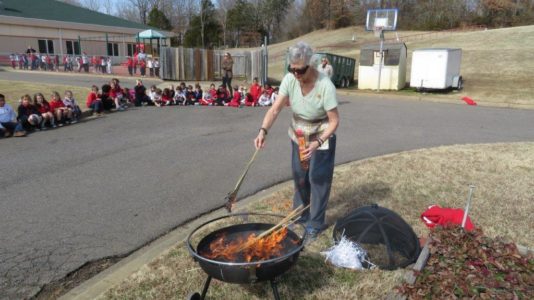
SOUTHAVEN – In this 2018 photo, Sister Margaret Sue Booker shows Sacred Heart students how last year’s palms from Palm Sunday become this year’s ashes for Ash Wednesday. Sister Booker has made a tradition of bringing the students outside to watch the fire and talk about the Liturgical seasons. (Photo courtesy of Laura Grisham)
Ash Wednesday also is a day of abstinence and fasting; Good Friday is another. Abstinence means refraining from eating meat; fish is OK. Fasting means reducing one’s intake of food, like eating two small meals that together would not equal one full meal.
“Fasting during Lent followed the example of Jesus’ 40-day fast in the wilderness. It also recalled the 40 days that Moses fasted on Sinai and the 40 days that Elijah fasted on his journey to Mount Horeb,” Father Stice said.
“In the second century, Christians prepared for the feast of Easter with a two-day fast. This was extended to all of Holy Week in the third century. In 325 the Council of Nicea spoke of a 40-day period of preparation for Easter as something already obvious and familiar to all.”
The U.S. Catholic Church’s Collection for Aid to the Church in Central and Eastern Europe is taken up on Ash Wednesday, as it has been since its inception in the early 1990s.
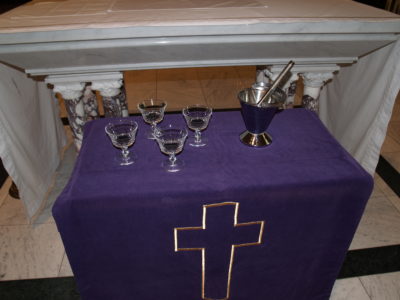
Ashes wait for their blessing with holy water at the Cathedral of St. Peter the Apostle on Ash Wednesday 2018.
Católicos en el Mundo
PANAMA CITY (CNS) – El Papa Francisco oró por encontrar una solución pacífica a la inestabilidad e incertidumbre que reina en Venezuela. (Por Junno Arocho Esteves)
CARACAS, Venezuela (CNS) – La conferencia episcopal venezolana dice que el nuevo gobierno de Nicolás Maduro es ilegítimo y ha pedido un cambio de gobierno. (Por Cody Weddle)
WASHINGTON (CNS) – Al no ser escuchados en su país, nicaragüenses piden ayuda de la OEA. (Por Rhina Guidos)
PINAR DEL RIO, Cuba – La Parroquia del Sagrado Corazón de Jesús, en el poblado de Sandino fue inaugurada en febrero 27 y es una de las únicas tres iglesias que el Gobierno cubano ha autorizado construir.
CIUDAD DE MÉXICO (CNS) – La conferencia de obispos mexicanos confirmó que 152 sacerdotes en los últimos nueve años han sido suspendidos de su ministerio por abusar sexualmente de menores. En una declaración publicada el 12 de febrero, la conferencia publicó la figura preliminar, aunque prometió que: “En los siguientes meses se continuará con el esfuerzo por tener el diagnóstico completo de casos de abuso sexual infantil en México”. (Por David Agren)
CUCUTA, Colombia (CNS)—Iglesias en la frontera de Colombia trabajan para asistir a venezolanos desesperados. En Colombia, agencias de caridad católicas están haciendo todo lo posible para ayudar a los venezolanos que entran al país buscando medicina, comida, y trabajo. El comedor social de la Divina Providencia en Cucutá, proporciona unas 4,000 comidas diarias para migrantes y refugiados, cuatro veces más de lo que hacía cuando se abrió en 2017. (Por Manuel Rueda)
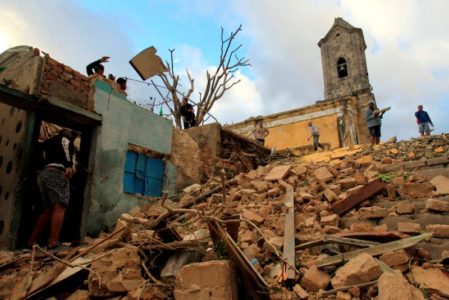
A damaged church is seen Jan. 28, 2019, the day after a tornado ripped through a neighborhood in Havana. An EF3 tornado and pounding rains smashed into the eastern part of Cuba’s capital, toppling trees, bending power poles and flinging shards of metal roofing through the air. (CNS photo/Reuters)
